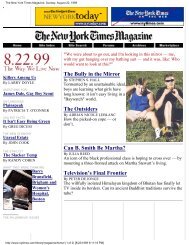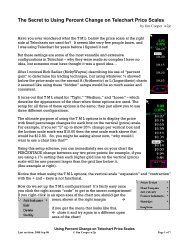The New York Times Magazine, Sunday, August 22, 1999
The New York Times Magazine, Sunday, August 22, 1999
The New York Times Magazine, Sunday, August 22, 1999
You also want an ePaper? Increase the reach of your titles
YUMPU automatically turns print PDFs into web optimized ePapers that Google loves.
<strong>The</strong> Outsiders<br />
but overall they are getting better, definitely."<br />
he quips ricochet around the bedroom like friendly-fire darts. Myles<br />
Forrest, 16, a sophomore with baby fat and sweet eyes, is one of George<br />
Farley's closer friends. George, also 16, is a floater. He has set up camp<br />
with ConVal's freaks for now. George sees weakness everywhere -- in women<br />
who look for milk cartons with the latest expiration date at the store where he<br />
works; in the unemployed drunk who receives an allowance from his working<br />
wife; in white girls who think they are cool because they date guys who are<br />
black. Softness arouses his contempt. He is no more gentle with himself. <strong>The</strong><br />
volleying with Myles, who wears his Y2K T-shirt -- "01-01-00" -- relieves<br />
George of the clearly burdensome obligation of having so much edge.<br />
"<strong>The</strong> end of Myles's life," George starts.<br />
"<strong>The</strong> end of life as we know it," Myles says. <strong>The</strong> phone rings. George lifts the<br />
receiver. "Myles Forrest, loser," he announces, and so the afternoon begins.<br />
Myles and George provide sustenance between insults. Myles fiddles with his<br />
computer -- one of two -- as George peers out over the street. "What's up with<br />
the dress?" George asks, spotting an exchange student from ConVal.<br />
"What? He's Hindu," says Myles.<br />
"I said, What's up with the dress?"<br />
"It's like a cult thing," Myles says, somewhat sharply.<br />
"That's a dress," George says, losing steam.<br />
"It's like a cult thing. It's like a kilt."<br />
"You know I'm messing with you, don't go getting all politically correct with<br />
me." (Later on, Myles will explain the theory of equal-opportunity hatred: "You<br />
ever notice that you can't hate a particular group, but if you generally hate<br />
everybody nobody seems to mind?") <strong>The</strong> sarcasm slows when the Quake<br />
competition begins.<br />
It strikes me as I watch them in front of the famously violent video game that it<br />
is one way for the boys to enjoy closeness without it being threatening. <strong>The</strong><br />
violence of the game, the state-of-siege mentality, the technical expertise<br />
required, supplant the macho expectations and give the boys a rest from the<br />
relentless one-upmanship. Rather than insult each other, they can attack the<br />
game. Soon enough, they are allies in the search for snacks, rushing down the<br />
stairs. <strong>The</strong>y amble past the locked gun case behind the door leading through the<br />
playroom, to the kitchen. George sticks his head in the fridge.<br />
http://www.nytimes.com/library/magazine/home/<strong>1999</strong>08<strong>22</strong>mag-boys-social-coping.html (6 of 13) [8/<strong>22</strong>/<strong>1999</strong> 9:18:<strong>22</strong> PM]






